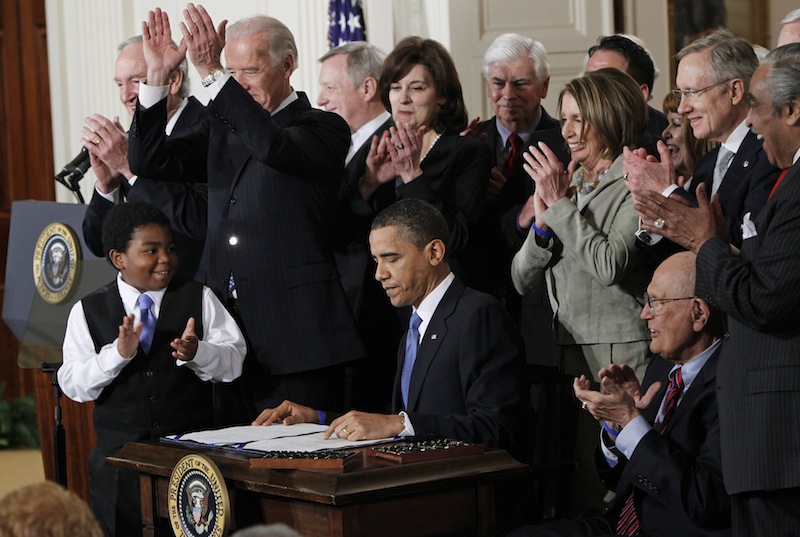Americans whose 2013 health insurance policies were supposed to be canceled this year because they don’t meet tough new standards under the Affordable Care Act can now renew those noncompliant policies for another two years if their home states allow it, the Obama administration announced Wednesday.
The administration’s second canceled-policy “fix,” following a one-year extension granted in November, was the most notable and controversial of several new executive branch tweaks made to the health law for next year.
Theoretically, the move allows about 500,000 individual and 1 million small group health policies to continue through October 2017.
The decision to extend the policies was made in “close consultation” with a handful of congressional Democrats facing tough re-elections, including Sens. Mary Landrieu of Louisiana and Jeanne Shaheen of New Hampshire. Both called for consumer-friendly changes to the health law.
Congressional Republicans were counting on a wave of policy expirations later this year to fuel potent attacks on these and other Democrats who voted for the health law. But the new extension, which must be approved by state insurance departments, could now provide Democrats’ valuable political cover.
Obama officials said employers, consumers, insurers and other stakeholders were consulted about the extension. But Senate Minority Leader Mitch McConnell, R-Ky., called the announcement a “desperate move to protect vulnerable Democrats in national elections later this year.”
“By announcing a new delay in requiring that policies meet minimum coverage standards, the administration avoids a new round of health policy cancellations set to hit shortly before the November elections,” McConnell said in a statement. “What makes this latest delay so troubling is the fact that it was prompted not by the heartbreaking stories of millions of Americans, but by the private pleadings of a handful of endangered Democrats.”
The administration was already under fire from conservative legal activists and Republican lawmakers for changing important Affordable Care Act rules and implementation timetables without approval from Congress. Senior White House officials said Wednesday’s adjustments would be the last significant changes in the health law’s rollout for 2015.
“No major changes are anticipated at this point,” a senior administration official, speaking on condition of anonymity as a matter of Obama administration policy, said during a telephone press briefing. “I think (Health and Human Services) Secretary (Kathleen) Sebelius and (Treasury) Secretary (Jack) Lew have gone through and identified every major policy that needs to be addressed.”
After public outrage over policy cancellations and President Barack Obama’s broken promise that Americans could keep their coverage if they liked it, the president allowed one-year extensions in November for 2013 policies that lacked the beefed-up coverage and consumer protections required under the law.
About half the states agreed to the extension, although state regulators feared the mix of old and new plans could drive premiums higher in 2015 and disrupt the insurance markets, which were already adjusting to the new marketplaces.
Adam Hamm, president of the National Association of Insurance Commissioners and North Dakota insurance commissioner, sounded similar concerns on Wednesday. Even though the two-year extension would apply only to current policies and not new insurance purchases, “it still has the potential to create confusion surrounding available options for health insurance and uncertainty in the restructured marketplace,” Hamm said.
Each state insurance commissioner will have to consider how further extensions would affect their markets, he added. “Even if the regulator decides to allow the plans to continue without coming into compliance, carriers may still cancel plans, as we saw in several states after the November announcement,” Hamm added.
Karen Ignagni, president of America’s Health Insurance Plans, was equally concerned.
“There is broad agreement that if more young and healthy individuals choose not to participate in the new marketplaces, it could lead to higher premiums for those consumers that remain in the exchanges,” she said. “That is why it is crucial that sufficient steps be taken to stabilize the market, and we are currently reviewing the new changes to the premium stabilization programs to assess their impact on affordability for consumers.”
The health law’s temporary “risk corridor program,” which runs from 2014 to 2016, will help mitigate the extra costs that insurance companies may incur if a disproportionate share of sicker people signed up for coverage under the canceled policy extension.
Under the program, insurers that spend less on benefits than projected would pay the federal government a share of the difference, while those that spend more would be reimbursed by the government. The administration believes that the declining number of people with extended policies won’t substantially alter insurers’ bottom line.
This would allow the program to operate in a budget-neutral manner, with incoming payments balancing outgoing payments.
Copy the Story LinkSend questions/comments to the editors.



Success. Please wait for the page to reload. If the page does not reload within 5 seconds, please refresh the page.
Enter your email and password to access comments.
Hi, to comment on stories you must . This profile is in addition to your subscription and website login.
Already have a commenting profile? .
Invalid username/password.
Please check your email to confirm and complete your registration.
Only subscribers are eligible to post comments. Please subscribe or login first for digital access. Here’s why.
Use the form below to reset your password. When you've submitted your account email, we will send an email with a reset code.